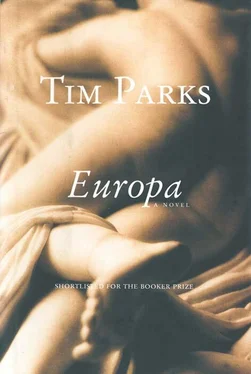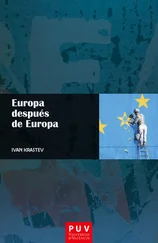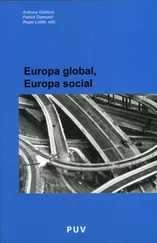She was proud of being French, she said, because the French Revolution lay at the heart of modern Europe. The principles of liberté, fraternité, égalité had transcended national borders and become the rights of every man, and finally the principles upon which the whole of Europe was built. In the great release of energy which came with the separation from her husband and her daughter’s first attendance at nursery school, she bought quantities of books and suggested we read them together and discuss them together. It would be exciting, she said, to have a fresh and intellectual relationship with someone after the years of tedium and near-moronic materialism with her picture-frame-entrepreneur husband. Plus it would be good for me, she said. It would be important for my sense of self-esteem, my sense of being someone going somewhere . So we read Chateaubriand and Benjamin Constant and the Duchesse d’Abrantes and Michelet, which had been her special area of study, and we read Xenophon and Thucydides and Plato and Aristophanes, which had been my area of study, and we discussed them together, usually after making love, in the afternoon in the p ensione she stayed in when she taught consecutive days in Milan. We lay on the narrow bed, still clasping, still hot and damp, and we discussed, after perhaps hours of mutual adoration and oral sex and never without a bottle of Martini, for she was addicted to ice-cold white Martini, Plato’s notion of a realm of ideal forms, and we would try to relate that to the way the Revolution had, as it were, discarded men to champion an idea of man, an ideal man, since surely, or at least this was my feeling, it was this shift that lay behind the notion of égalité and of a single civil code for all the world. Man should be an incarnation of an idea rather than himself. Man should be a European . Or we would discover that Plutarch’s picture of Sparta was not unlike stories of Stalinist Russia, not unlike, in other ways, The Reign of Terror, or Nazi Germany — a European speciality, it seemed — and apropos of police states various we came across that other line of Benjamin Constant where he says: There is no limit to the tyranny that strives to extort the symptoms of consensus. Then discussing all these things quite seriously — orthodoxy and state terror and media hype — while drinking Martini and smoking the Gauloises Blondes she smokes, we would fall to making love again, remembering how all the great men we were talking about had loved women passionately, Talleyrand to start with, and more coyly Chateaubriand, not to mention Alcibiades, and how the great women we were talking about had loved men likewise, and likewise passionately, Ariadne and the Duchesse d’Abrantes, Madame de Staél and Medea, and how Napoleon had certainly been lying to Madame de Staél when he said the best women were the women who bore most children, that was Sparta talk, since the best women, it was obvious I said, coming up for a moment’s air from the taste of my triumph, the best women were the women who turned you on most and fucked you best. And fucking then, after those long and learned conversations, perhaps in the soft warmth of an autumn afternoon with the shriek of the trams clanging through the open window from the streets of ‘an ever-industrious Lombardy, we felt so sensual, and so intelligent, and intelligence seemed part of sensuality and sensuality part of intelligence and both together at once sacred and revelatory, though revelatory quite of what it would have been hard to say. Of their sacredness perhaps.
But how infantile! I think now, sitting up suddenly in another narrow bed and feeling the chill on my shoulders, a flash of yellow light crossing my face. How utterly infantile! And how extraordinary, I tell myself, sitting bolt upright on this narrow bed and shivering in this miserable hotel room, how infantile that you should ever have engaged in such conversations! How humiliating to think that you were not aware of the merest vanity in all this, the spurious stimulation of imagining yourself wise and communing with someone wise, discussing the world of pure form, or the noble savage, or the social contract, etc., when the only thing really speaking between the cheap sheets of that cheap pensione with the supermarket Madonna over the bedstead and the daguerreotype of the Duomo by the door was the sly old complicity of cock and cunt. What else? And remembering how, after my not incomprehensible choking fit at the farcical stube supper, I had retired to the loo to piss, to get a grip on myself, and seen a certain graffito there and thought certain thoughts, until I shouted out loud (over a urinal produced by Ideal Standard), How little philosophy helps! it comes to me now, in the soft slide of passing headlights, that the reason philosophy helps me so little is because the kind of philosophizing we traded on that narrow bed in the Navigli, the grand thoughts and acute perceptions we whispered back and forth, the parallels across thousands of years and the flattering identifications of ourselves with the great figures of Western history and mythology, was no more than another tool of mutual seduction, like the smell and smoothness of skin, like the tone and accent of her foreign voice, her French laugh, like the diving cleavage of that beaded black chiffon and the delirious awareness of her tottie-tackle (Colinism) beneath. Thought itself is an erotic memory for you , that is the truth, I am bound to admit now, sitting up in my narrow bed in this Strasbourg hotel which might be any of a whole series of hotels we once stayed in. Yes, the headiness of thinking, and I mean the sort of thinking that approaches mystery and sacredness, the sort of thinking that makes life exciting , is the same headiness of burrowing into her twat on soft Milanese afternoons with the clang of the trams ringing in the air and a low honey sunlight stealing across the wall Thought, like hotel rooms, reminds me of her . And perhaps this explains why I simply stopped reading, from one day to the next, after the Napoleonic debacle. For two years, I tell myself, you read intensely, insatiably, with immense pleasure and with a deeply gratifying sense of power and self-esteem, because reading was to do with her , and to do with conversations you had with her, to do with what she wanted to make of you and what you wanted to be for her, until, from one day to the next, you could not read any more . And not only were you unable to read any more, but the meaning of everything you had read to date was suddenly and frighteningly shifted, was even inverted, from self-esteem to self-loathing, from a belief in your own intuition to a conviction of your own blindness, a conviction born from the irony that you had read in so many places of the experience you were now going through, to wit the experience of betrayal, of being cut off, abandoned by the gods, of intensity enjoyed and intensity lost — and, quite apart from reading about it, you had even inflicted that same experience on your wife — but still without ever believing that one day this might happen to you, just as one never truly believes, perhaps, in the sense of savouring fully and accepting completely, that one is going to die. From one day to the next you stopped reading entirely. Black Spells Magic is perhaps the first book you have seriously tried to read in a year and a half. Does this explain your inappropriate anger with your daughter? That she should have invited you to start reading again with this ridiculous tale of the magical and politically correct powers of sexual passion! And how bewildering, I tell myself, sinking back on my pillows, how ominous, that once again today, this very evening in fact, on the coach returning from the stube supper, you should have sat by her side, her in her black chiffon dress with full French tottie-tackle beneath, and once again heard her say, vis-a-vis the founding brief of the Petitions Committee of the European Parliament — its function, that is, as a body for righting all wrongs — that the principles of liberte, fraternité and égalité lie at the heart of modern Europe.
Читать дальше












